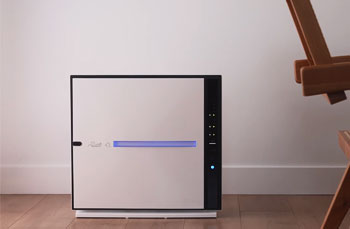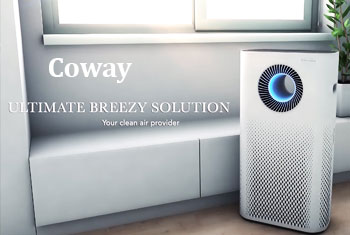Air purifiers have become increasingly popular in recent years as more people look for ways to improve indoor air quality. Two of the top brands in the air purifier market are Rabbit Air and Coway.
But which one is better? Here is an in-depth comparison of the key features, performance, and value of Rabbit Air and Coway air purifiers.
Brief Comparison Table
| Features | Rabbit Air | Coway |
| Filtration stages | 4-7 stages | 3-4 stages |
| HEPA filter | Yes | Yes |
| Activated carbon filter | Yes | Yes |
| Ionizer | Some models | Some models |
| Sensor types | Particle, odor, air quality | Particle only |
| Smart features | App control, air quality monitoring | Auto mode, filter change indicator |
| Noise level | 22 – 46 dB | 24 – 53 dB |
| CADR ratings | Up to 700 sq ft | Up to 361 sq ft |
| Warranty | 5 years | 3 years |
| Price range | $370 – $899 | $170 – $749 |
Overview of Rabbit Air Purifiers
Rabbit Air purifiers are known for their stylish, compact designs and multi-stage filtration systems. Key features include:

- 4-7 filtration stages – Their most advanced model has a 7 stage filtration system including pre-filter, Medium Filter, BioGS HEPA filter, Customized Filter, Negative Ion Generator, Activated Carbon filter, and Photo Catalyst filter. This comprehensive filtration captures allergens, odors, gases, viruses, and ultrafine particles.
- HEPA filter – All Rabbit Air purifiers use a true medical grade H13 HEPA filter that removes 99.97% of particles 0.3 microns and larger. Great for allergens and pollutants.
- Activated carbon filter – The charcoal-based activated carbon filter removes household odors, VOCs, and gases. The customized filter options allow you to enhance filtration for specific needs.
- Quiet operation – Their noise levels range from 22 dB to 46 dB on the highest setting so you can comfortably run it while sleeping or working. Has a “silent mode” under 30 dB.
- Compact sizes – Measures 14.6 to 22.2 inches in height making them easy to place in small rooms and spaces. Weighs 15 to 21 pounds.
- Air quality sensors – Monitors particles, odors/gases, ambient light, and temperature to optimize performance automatically. Some models have smartphone app connectivity.
- 5 year warranty – Industry leading warranty provides peace of mind on your investment.
Overview of Coway Air Purifiers
Coway air purifiers are best known for their efficient HEPA filtration, compact sizes, and intuitive auto mode features. Key highlights include:
- 3-4 stage filtration – Most Coway models have a pre-filter, activated carbon filter, and True HEPA filter to capture various pollutants. Some larger models add a plasma ionizer stage.
- HEPA filter – Uses a high quality HEPA filter certified to remove up to 99.97% of particles 0.3 microns and larger.
- Activated carbon filter – Pre-filter and activated carbon filter work together to trap odors, gases, and large particles.
- Auto mode – Intelligent auto mode adjusts fan speed automatically based on indoor air quality. Helpful for hands-off, efficient operation.
- Real-time particle sensor – Air quality indicator changes color to let you see particle levels at a glance. Models do not have odor or gas sensors.
- Quiet operation – Rated 24 – 53 dB on highest fan speed depending on the model. Most operate quietly in auto mode.
- Compact and portable – Slim tower design takes up minimal space. Units are about 17 to 19 inches tall weighing 10 to 15 pounds.
- 3 year warranty – Coway covers defects and flaws for 3 years after purchase date. Provides peace of mind but shorter than Rabbit Air’s 5 years.
Also Read: Comparison Between Coway and Dyson air purifiers
Key Differences Between Rabbit Air and Coway
Now let’s dive into a detailed, side-by-side comparison of the key similarities and differences between Rabbit and Coway air purifiers.
Filtration Stages

- Rabbit Air offers 4 to 7 filtration stages depending on the model. This includes pre-filter, medium filter, BioGS HEPA filter, activated carbon filter, negative ion generator, and customized options like pet allergen/odor filter, toxabsorber filter, etc. Offers the most comprehensive filtration on the market.
- Coway air purifiers have 2 to 4 stages of filtration. Usually consists of a pre-filter, carbon filter, and HEPA filter. Larger models add a plasma ionizer stage. Gets the job done for common pollutants but fewer stages than Rabbit Air.
HEPA Filter Efficiency
- Both brands use True HEPA filters that remove 99.97% of particles 0.3 microns and larger. This includes allergens, dust, pet dander, mold spores, and bacteria.
- Rabbit Air specifically uses a BioGS HEPA filter infused with an antimicrobial agent to inhibit bacterial and microbial growth on the filter surface. Adds extra protection.
- Coway HEPA filters do not have antimicrobial properties but are still highly effective at trapping ultrafine particles. Overall HEPA performance is comparable between the brands.
Activated Carbon Filter
- Rabbit Air has an activated carbon filter in all models to adsorb household odors, VOCs, smoke, and gaseous pollutants. Select models allow you to customize the filter for enhanced gas/odor removal.
- Coway air purifiers also include an activated carbon filter but it is combined with the pre-filter rather than as a separate stage. Still captures odors and gases but less filtration media compared to Rabbit Air’s standalone filter.
- Rabbit Air carbon filters tend to last longer – up to 3 years based on air quality. Coway recommends replacing the combo pre-filter and carbon filter every 6-8 months.
Ionizer Stage
- Certain Rabbit Air and Coway models include an ionizer stage that helps remove ultrafine particles. However some people prefer to avoid ionizers due to potential ozone emissions.
- Rabbit Air’s ionizer is a negative ion generator which does not cause harmful ozone production. Coway ionizers use plasmacluster technology that releases some ozone.
- The ionization stage is optional/removable in both brands and not present on all models. Can help boost particle removal but not a must-have feature.
Air Quality Sensors
- Rabbit Air purifiers have multiple sensors to detect particles, odors/gases, ambient light, and temperature. Automatically adjusts settings as needed.
- Coway relies on a single particle sensor. It changes color based on detected particle levels but does not actively monitor odors and gases.
- Rabbit Air offers better smart automation, responding to a wider range of indoor air quality factors. More comprehensive monitoring.
Noise Levels
- Rabbit Air units run between 22 dB on lowest setting up to 46 dB on max. Provides very quiet operation, especially in sleep mode.
- Coway noise levels range from 24 dB to 53 dB. Also relatively quiet but high speed is louder than Rabbit Air’s max noise output.
- In auto mode, both brands maintain low noise levels most of the time. But Rabbit Air is notably quieter across all fan speeds.
Room Coverage
- Rabbit Air purifiers have CADR ratings from 100 to 700 sq ft, making them suitable for small to very large rooms. Can effectively clean the air in spaces up to 700 sq ft.
- Coway models have CADR ratings between 246 and 361 sq ft. Recommended for medium to large rooms, up to about 750 sq ft total area.
- Rabbit Air maxes out at covering larger spaces up to 700 sq ft with a single unit. But both brands offer models for average sized rooms under 500 sq ft.
Also Watch This Review Video:
Smart Features
- Rabbit Air has WiFi connectivity allowing full app control, air quality monitoring, and filter status notifications. Very convenient smart features.
- Coway purifiers operate on manual mode or the intelligent auto mode. Provides hands-free convenience but no app or smartphone notifications.
- Only Rabbit Air gives you fine-tuned control and real-time air quality updates through the connected app. Coway relies on auto mode simplicity.
Warranty
- Rabbit Air purifiers come with an exceptional 5 year warranty that covers defects and flaws for 5 years after the original purchase date.
- Coway offers a more standard 3 year limited warranty from the purchase date. Still good but 2 years less coverage than Rabbit Air.
- For longest lasting protection on your investment, Rabbit Air provides better peace of mind. But Coway also adequately stands behind their products.
Pricing
- Rabbit Air air purifiers range from $370 for the MinusA2 model up to $899 for the BioGS 2.0. Offers affordable options as well as high-end models with every bell and whistle.
- Coway prices start around $170 for entry level units and go up to $749 for the largest models with the most features. Very budget friendly starting prices.
- Coway caters best to buyers looking for low initial costs. But Rabbit Air offers better value for money when you factor in superior warranties, technology, and filters.
Also Read: Comparison Between the Coway Airmega 150 and AP-1512HH
Frequently Asked Questions (FAQs)
Rabbit Air is generally considered worthwhile for buyers willing to pay more upfront for better performance, features, and reliability. The superior HEPA filtration, wider sensor technology, and 5 year warranty provide excellent value compared to other high-end brands. People with allergies and sensitivity swear by Rabbit Air purifiers.
For overall performance and value, the Rabbit Air MinusA2 and BioGS 2.0 are among the most highly recommended air purifiers. They offer robust filtration, intuitive auto modes, very quiet operation, and helpful smart features for keeping indoor air pure. Other top options are the Blueair Blue Pure 211+ and the Alen BreatheSmart 75i.
Yes, Coway makes quality air purifiers that use proven HEPA and carbon filtration to remove indoor air pollutants. They are best known for high efficiency particulate removal and energy-saving auto modes at an affordable price point. Coway air purifiers are a good choice on a budget if you don’t need all the bells and whistles.
The main competitors for Rabbit Air include other premium brands like Blueair, Austin Air, IQAir, and Alen Air. These brands offer similar HEPA filtration, carbon stages, and smart features but at comparable higher price points. Mid-range options from Honeywell and Winix also compete with Rabbit Air for value-focused buyers.
Also Read: Differences Between IQair And Molekule.
Final Thoughts
For most buyers, Rabbit Air and Coway both offer reliable air purification in compact units. However, Rabbit Air stands apart with superior multi-stage filtration, lower noise levels, larger room capacity, and smarter automation.
People with strong air quality concerns or larger spaces would benefit most from choosing a Rabbit Air purifier.
Coway air purifiers excel at delivering solid HEPA filtration and intuitive auto modes at an affordable entry price for smaller rooms. Budget-focused buyers will appreciate Coway’s minimalist approach, lower upfront investment, and energy efficient operation.
Overall, Rabbit Air takes the lead over Coway for its unparalleled filtration breadth, whisper-quiet operation, intelligent sensors, and industry leading 5 year warranty. But Coway remains a cost-effective option for getting basic but effective high-quality HEPA purification.
Choosing between the two brands ultimately depends on your specific needs and budget considerations when upgrading your indoor air environment.
